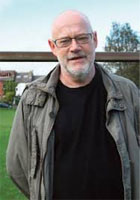Robert Ian Duhig Biography
Robert Ian Duhig (born 9 February 1954 London) is a British poet.
He was the eighth of eleven children born to Irish parents. He graduated from Leeds University.
He worked for 15 years with homeless people.
He is a writer and teacher of creating writing at various institutions, including the Arvon Foundation.
Duhig writes occasional articles for magazines and newspapers including Moving Worlds, The Sunday Times and the Independent on Sunday. He has also worked on a variety of commissions, particularly involving music. He wrote 'In the Key of H' with the contemporary composer Christopher Fox for the Ilkley Festival, co-operating again with Fox on an insert to 'The Play of Daniel', which can be heard on Fox's DVD 'A Glimpse of Sion's Glory'. He was commissioned by The Clerks, a vocal consort specialising in pre-baroque music, to write new poems for 'Le Roman de Fauvel', which was first performed at the Queen Elizabeth Hall on the South Bank in 2007, and enthusiastically reviewed in The New York Times when performed in that city in 2009.
Duhig is an anthologised short story writer, represented in the award-winning 'The New Uncanny' from Comma Press, a creative updating of Freud's famous essay with other writers including A.S Byatt and Hanif Kureishi. He has also written for radio and the stage, the latter most recently with Rommi Smith, directed by Polly Thomas, on 'God Comes Home' at the West Yorkshire Playhouse in 2009. This considered the ramifications of the case of David Oluwale, a homeless Nigerian immigrant to Leeds, who died after a campaign of persecution by two local policemen. Duhig has written poems about this tragic story, one of which appears in Kester Aspden's 'The Hounding of David Oluwale', published by Jonathan Cape.
He lives in Leeds, completely out of the literary world.
— John Freeman
Thrillers like The Da Vinci Code are one of the key indicators of
contemporary ideological shifts.
...
Who I am's child's play,
a cry in a kindergarten;
though I pun on Latin,
my Yorkshire kin's laik,
...
A Sixties man thing: Dad, us, circling to bond
as hard as Ingemar Johansson's glue in the ad
around our huge box, its screen a snow globe
...
I love them. They bring a little antilife and uncolour
to the Corn Exchange on city centre shopping days,
as if they had all just crawled out of that Ringu well,
so many Sadakos in monochrome horror, dripping
silver jewellery down flea-market undead fashions.
They are the black that is always the new black;
their perfume lingers, freshly-turned-grave sweet.
Black sheep, they pilgrimage twice a year to Whitby
through our landscape of dissolved monastery and pit,
which they will toast in cider'n'blackcurrant, vegan blood.
They danse macabre at gigs like the Dracula Spectacula.
Next day, lovebitten and wincing in the light, they take
photographs of each other, hoping they won't develop.
...
The M1 laid, they laid us off;
we stayed where it ran out in Leeds,
a white rose town in love with roads,
its Guinness smooth, the locals rough.
Some nights we'd drink in Chapeltown,
a place not known for Gaeligores,
to hear Ó Catháin sing sean-nós -
Ó Riada gave him the crown.
Though most were lost by ‘Róisín Dubh',
all knew his art was rich and strange
in a pub soon drowned by our black stuff
when we laid the Sheepscar Interchange.
Pulped books help asphalt stick to roads
and cuts down traffic-sound as well;
between white lines a navvy reads
black seas of words that did not sell.
...
